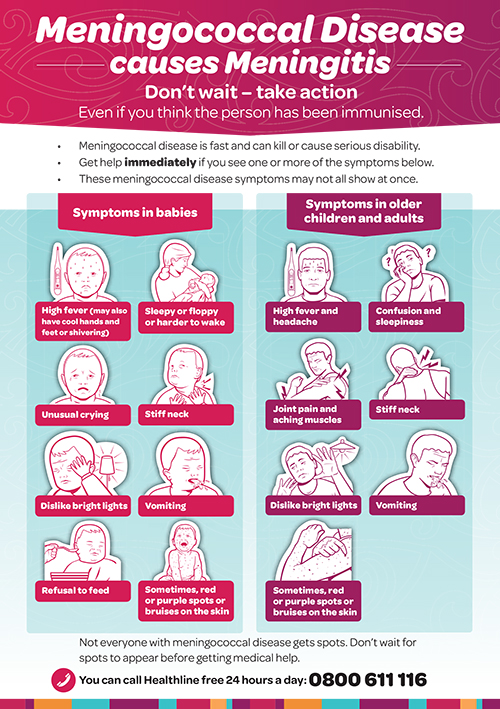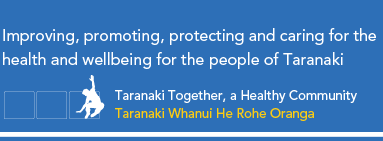Meningococcal disease
 Meningococcal disease is a bacterial infection caused by a group of bacteria known as Neisseria meningitidis. There are at least 12 different strains of this bacteria around the world, including A, B, C, W and Y.
Meningococcal disease is a bacterial infection caused by a group of bacteria known as Neisseria meningitidis. There are at least 12 different strains of this bacteria around the world, including A, B, C, W and Y.
In New Zealand, historically, most of our cases have been caused by the B-strain, but more recently around 50 per cent of reported cases were due to Y, W and C strains. The A strain is very rare here, but is more prevalent overseas.
Meningococcal infection can cause several types of illness but the two most common are:
- Meningitis (an infection of the lining around the brain)
- Meningococcal septicaemia (blood poisoning)
All are extremely serious and meningococcal infection carries a high mortality rate of around 10-20 per cent. It can affect anyone – but it’s more common in children under the age of 5, teenagers, and young adults. Students in their first year of tertiary education living in student accommodation may also be at higher risk. There is an average of two to three cases reported each year in Taranaki.
Newly funded meningococcal vaccine
From 1 December 2019, young people aged 13-25 years, in "close-living situations", will be eligible to receive a funded meningococcal vaccine. The funding covers a vaccine known as Menactra which protects against four strains of the meningococcal disease (A,C,W and Y), but doesn't cover the common B-strain of the disease.
There is a vaccine available that protects against meningococcal B (known as Bexsero) but it is not funded and available at a cost of around $200-$300 for a course.
To be eligible for the funded Menactra vaccine, you need to be 13-25 years of age and be in a close-living situation with others. This includes people in boarding schools, hostels, university halls of residence, prisons and other institutions.
Until 30 November 2021, it’s also free for people aged 13-25 years who are currently living in these places but are not in their first year.
Signs and symptoms of meningococcal disease
It’s important to know the signs and symptoms of meningococcal disease because it can develop very quickly. It can be treated with antibiotics, but early treatment is very important to save lives and prevent long-lasting complications including hearing loss, brain damage, seizures or limb amputations.
Meningococcal disease can be difficult to diagnose because at the start it can look like other illnesses, such as the flu.
Symptoms of meningitis can develop suddenly and include:
- a high fever
- headache
- sleepiness
- joint and muscle pains.
There can also be some more specific symptoms, such as:
- a stiff neck
- dislike of bright lights
- vomiting
- crying
- refusal to feed (in infants)
- a rash consisting of reddish-purple pin-prick spots or bruises.
If you notice any of the symptoms of meningococcal disease or have any other concerns, contact your doctor without delay – or call Healthline free on 0800 611 116 at any hour of the day or night, even if you have already been seen by a health professional.
Who else should have the meningococcal vaccine
Some meningococcal vaccines are recommended and available free for individuals:
- who have had or are having an operation to partly or completely remove the spleen (splenectomy)
- with a spleen that doesn’t work properly (functional asplenia)
- with HIV, complement deficiency (acquired or inherited) or who are pre- or post-solid organ transplant
- who are bone marrow transplant patients
- following immunosuppression
- who are close contacts of cases of meningococcal disease.
Check with your health professional whether they have the vaccine in stock before making an appointment to get vaccinated against meningococcal disease.
 Meningococcal disease is a bacterial infection caused by a group of bacteria known as Neisseria meningitidis. There are at least 12 different strains of this bacteria around the world, including A, B, C, W and Y.
Meningococcal disease is a bacterial infection caused by a group of bacteria known as Neisseria meningitidis. There are at least 12 different strains of this bacteria around the world, including A, B, C, W and Y.

